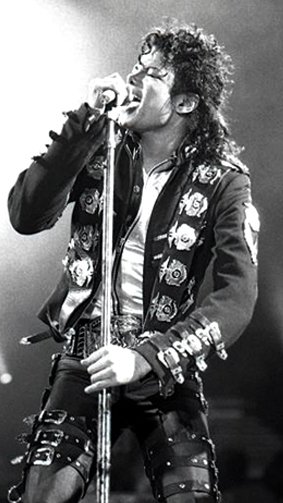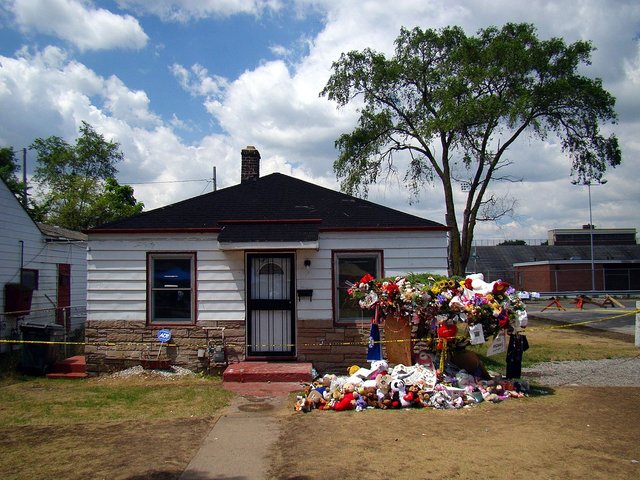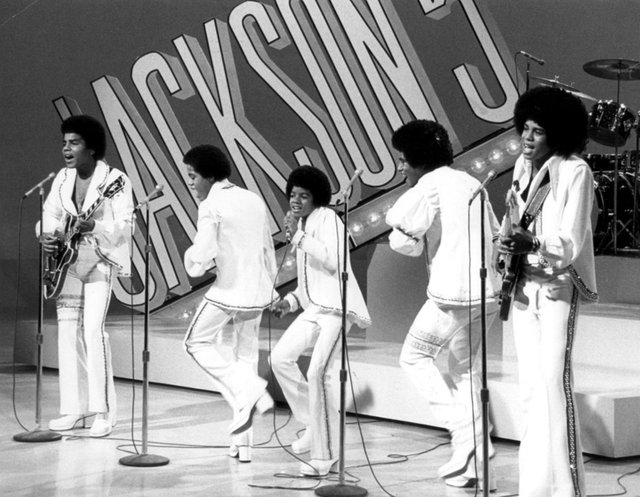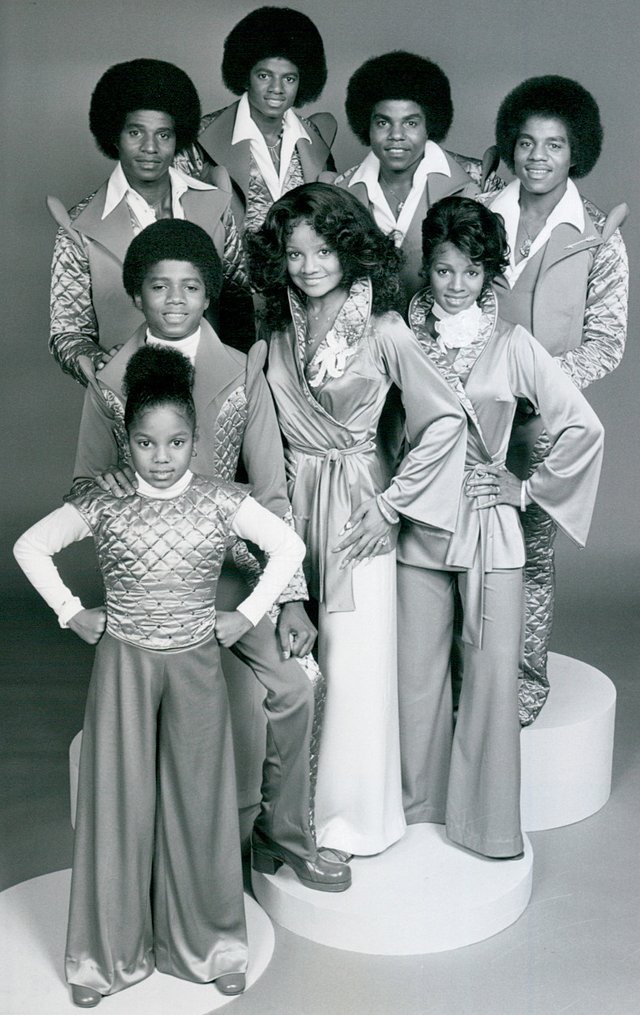
By Zoran Veselinovic - http://www.flickr.com/photos/56492970@N07/5759638423/in/photostream/, CC BY-SA 2.0, https://commons.wikimedia.org/w/index.php?curid=15326180
Michael Joseph Jackson was born on August 29, 1958. He was the eighth of ten children in a working class African-American family living in a two-bedroom house on Jackson Street in Gary, Indiana, an industrial city and a part of the Chicago metropolitan area.[17][18] His mother, Katherine Esther Scruse, was a devout Jehovah's Witness. She played clarinet and piano and once aspired to be a country-and-western performer, but worked part-time at Sears to support the family.[19] Michael's father, Joseph Walter "Joe" Jackson, a former boxer, was a steelworker at U.S. Steel. Joe also performed on guitar with a local rhythm and blues band, the Falcons, to supplement the family's household income.[20] Michael grew up with three sisters (Rebbie, La Toya, and Janet) and five brothers (Jackie, Tito, Jermaine, Marlon, and Randy).[21] A sixth brother, Marlon's twin Brandon, died shortly after birth.[22]
Jackson had a troubled relationship with his father, Joe.[23][24] In 2003, Joe acknowledged that he regularly whipped him as a boy.[25] Joe was also said to have verbally abused his son, often saying that he had a "fat nose".[26] Jackson stated that he was physically and emotionally abused during incessant rehearsals, though he credited his father's strict discipline with playing a large role in his success.[23] In an interview with Martin Bashir for the 2003 documentary Living with Michael Jackson, Jackson recalled that Joe often sat in a chair with a belt in his hand as he and his siblings rehearsed, and that "if you didn't do it the right way, he would tear you up, really get you."[27][28]

By Original uploader was Ianmacm at en.wikipedia - Transferred from en.wikipedia, CC BY 3.0, https://commons.wikimedia.org/w/index.php?curid=12837285
Jackson's parents have disputed the longstanding allegations of abuse, with Katherine stating that while whipping is considered abuse today, it was a common way to discipline children at the time.[29][30][31] Jackie, Tito, Jermaine and Marlon have also said that their father was not abusive and that the whippings, which were harder on Michael because he was younger, kept them disciplined and out of trouble.[32] Speaking openly about his childhood in an interview with Oprah Winfrey broadcast in February 1993, Jackson acknowledged that his youth had been lonely and isolating.[33] His deep dissatisfaction with his appearance, his nightmares and chronic sleep problems, his tendency to remain hyper-compliant, especially with his father, and to remain childlike throughout his adult life are consistent with the effects of the maltreatment he endured as a young child.[34]
Jackson (center) as a member of the Jackson 5 in 1972.
In 1964, Michael and Marlon joined the Jackson Brothers—a band formed by their father and which included brothers Jackie, Tito, and Jermaine—as backup musicians playing congas and tambourine.[35] In 1965, Jackson began sharing lead vocals with his older brother Jermaine, and the group's name was changed to the Jackson 5.[21] The following year, the group won a major local talent show with Jackson performing the dance to Robert Parker's 1965 hit "Barefootin'".[36] From 1966 to 1968 the band toured the Midwest, frequently performing at a string of black clubs known as the "chitlin' circuit" as the opening act for artists such as Sam & Dave, the O'Jays, Gladys Knight, and Etta James. The Jackson 5 also performed at clubs and cocktail lounges, where striptease shows and other adult acts were featured, and at local auditoriums and high school dances.[37][38] In August 1967, while touring the East coast, the group won a weekly amateur night concert at the Apollo Theater in Harlem.[39]

By CBS Television - Original text : eBay item
photo front
photo back), Public Domain, https://commons.wikimedia.org/w/index.php?curid=16354100
The Jackson 5 recorded several songs, including "Big Boy" (1968), their first single, for Steeltown Records, a Gary, Indiana, record label,[40] before signing with Motown in 1969.[21] They left Gary in 1969 and relocated to the Los Angeles area, where they continued to record music for Motown.[41] Rolling Stone later described the young Michael as "a prodigy" with "overwhelming musical gifts" who "quickly emerged as the main draw and lead singer."[42] The group set a chart record when its first four singles—"I Want You Back" (1969), "ABC" (1970), "The Love You Save" (1970), and "I'll Be There" (1970)—peaked at number one on the Billboard Hot 100.[21] In May 1971, the Jackson family moved into a large home on two-acre estate in Encino, California.[43] During this period, Michael evolved from child performer into a teen idol.[44] As Jackson began to emerge as a solo performer in the early 1970s, he maintained ties to the Jackson 5 and Motown. Between 1972, when his solo career began, and 1975, Michael released four solo studio albums with Motown: Got to Be There (1972), Ben (1972), Music & Me (1973), and Forever, Michael (1975).[45] "Got to Be There" and "Ben", the title tracks from his first two solo albums, both became successful singles, as did a cover of Bobby Day's "Rockin' Robin".[46]
The Jackson 5 were later described as "a cutting-edge example of black crossover artists."[47] Although the group's sales began to decline in 1973, and the band members chafed under Motown's refusal to allow them creative input, they achieved several top 40 hits, including the top five single "Dancing Machine" (1974), before leaving Motown in 1975.[48]
1975–81: Move to Epic and Off the Wall
From left, back row: Jackie Jackson, Michael Jackson, Tito Jackson, Marlon Jackson. Middle row: Randy Jackson, La Toya Jackson, Rebbie Jackson. Front row: Janet Jackson (1977)
In June 1975, the Jackson 5 signed with Epic Records, a subsidiary of CBS Records,[48] and renamed themselves the Jacksons. Younger brother Randy formally joined the band around this time, while Jermaine chose to stay with Motown and pursue a solo career.[49] The Jacksons continued to tour internationally, and released six more albums between 1976 and 1984. Michael, the group's lead songwriter during this time, wrote hits such as "Shake Your Body (Down to the Ground)" (1979), "This Place Hotel" (1980), and "Can You Feel It" (1980).[35]
His work in film began in 1978, when he starred as the Scarecrow in The Wiz, a musical directed by Sidney Lumet that also starred Diana Ross, Nipsey Russell, and Ted Ross.[50] The film was a box-office failure.[51] While working on the film Jackson met producer Quincy Jones, though this was not the first time they had met (they originally met when Michael was 12, at Sammy Davis Jr.'s house).[52] Jones was arranging the film's musical score and agreed to produce Jackson's next solo album, Off the Wall.[53] In 1979, Jackson broke his nose during a complex dance routine. His subsequent rhinoplasty was not a complete success; he complained of breathing difficulties that would affect his career. He was referred to Dr. Steven Hoefflin, who performed Jackson's second rhinoplasty and subsequent operations.[54]
Off the Wall (1979), which Jones and Jackson co-produced, established Jackson as a solo performer. The album helped Jackson transition from the bubblegum pop of his youth to the more complex sounds he would create as an adult.[44] Songwriters for the album included Jackson, Rod Temperton, Stevie Wonder, and Paul McCartney. Off the Wall was the first solo album to generate four top 10 hits in the United States: "Off the Wall", "She's Out of My Life", and the chart-topping singles "Don't Stop 'Til You Get Enough" and "Rock with You".[55][56] The album reached number three on the Billboard 200 and eventually sold over 20 million copies worldwide.[57] In 1980, Jackson won three awards at the American Music Awards for his solo efforts: Favorite Soul/R&B Album, Favorite Soul/R&B Male Artist, and Favorite Soul/R&B Single for "Don't Stop 'Til You Get Enough".[58][59] He also won Billboard Year-End awards for Top Black Artist and Top Black Album, and a Grammy Award for Best Male R&B Vocal Performance for 1979 with "Don't Stop 'Til You Get Enough".[60] In 1981 Jackson was the American Music Awards winner for Favorite Soul/R&B Album and Favorite Soul/R&B Male Artist.[61] Despite its commercial success, Jackson felt Off the Wall should have made a bigger impact, and was determined to exceed expectations with his next release.[62] In 1980, he secured the highest royalty rate in the music industry: 37 percent of wholesale album profit.[6

By CBS Television - eBay item
photo front photo back
Transferred from en.wikipedia to Commons by User:We hope using CommonsHelper., Public Domain, https://commons.wikimedia.org/w/index.php?curid=18475174
Jackson recorded with Queen singer Freddie Mercury from 1981 to 1983, including a demo of "State of Shock", "Victory" and "There Must Be More to Life Than This".[64] The recordings were intended for an album of duets but, according to Queen's then-manager Jim Beach, the relationship between the singers soured when Jackson insisted on bringing a llama into the recording studio.[65] The collaborations were not officially released until 2014.[66] Jackson went on to record the single "State of Shock" with Mick Jagger for the Jacksons' album Victory (1984).[67] Mercury included the solo version of "There Must Be More To Life Than This" on his Mr. Bad Guy album (1985).[68]


